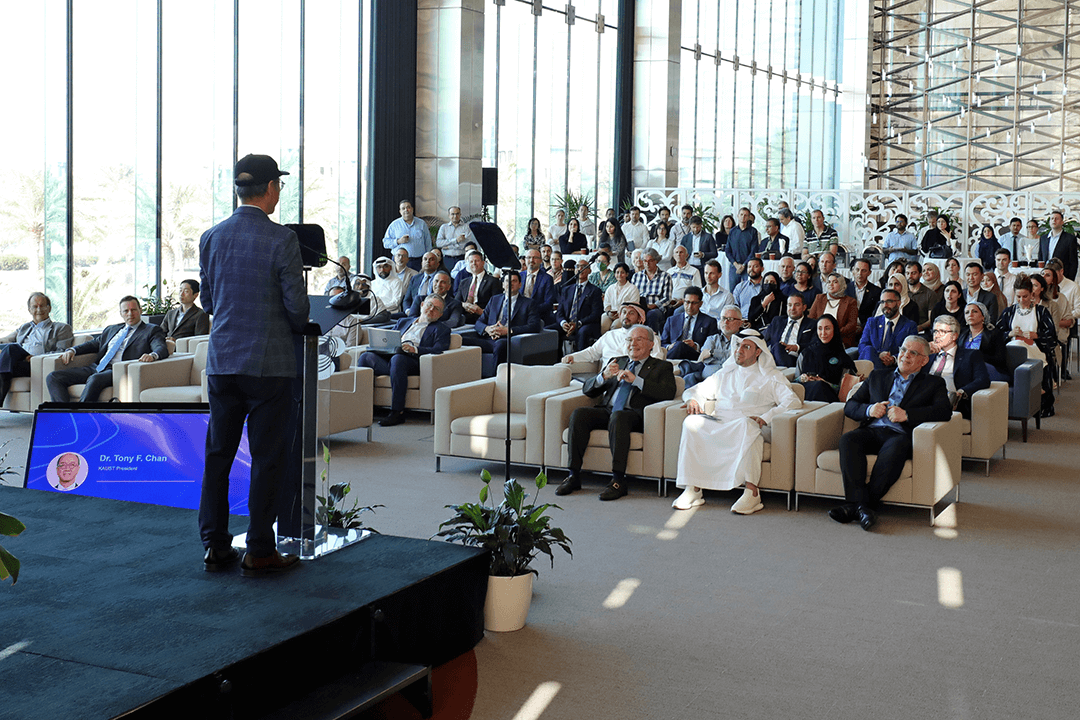KAUST healthcare collaborations usher era of precision personalized medicine

On November 2-3, KAUST Smart-Health Initiative (KSHI) held its annual forum, "Impacting the future of healthcare in the Kingdom of Saudi Arabia," where KSHI-affiliated professors came together with local and international partners to showcase current research projects and exchange ideas on novel healthcare approaches relevant to the Kingdom and MENA region.
Central to this event was the presentation of several research projects involving collaborations between King Abdullah University of Science and Technology (KAUST) and in-Kingdom partners, including King Faisal Specialist Hospital and Research Center (KFSHRC), King Abdullah International Medical Research Center (KAIMRC) and Alfaisal University and King Abdulaziz City for Science and Technology (KACST). A poster session led by KAUST students presented more than 40 research projects that are underway in KAUST laboratories involving an array of technologies and applications, from devices that enable biomarker detection to sensors used to diagnose cardiovascular disease to 3D visualization of data to genome sequencing and metagenomics for analysis of patient data.

Portrait of Dr. Sara F. Althari, biotech and pharma managing director and minister's advisor, Ministry of Investment (MISA). Photo courtesy Althari
In commenting on the importance of aligned healthcare collaborations with KAUST and other parties, Dr. Sara F. Althari, biotech and pharma managing director and minister's advisor, Ministry of Investment, said, "KAUST has not only been able to cultivate deep and meaningful partnerships with the Kingdom's healthcare and biotechnology ecosystem, but has also been remarkably efficient at building robust ties with international industry leaders."
Since its inception on March 28, 2021, KSHI has been working as a hub to create effective collaborations with researchers in academic institutions, physicians in healthcare institutions and the medical biotechnology industry. This hub is the ideal nurturing environment for innovative ideas that may solve old problems in the healthcare delivery system as well as utilize the vast advancement of the "omics" technologies to better understand the disease as well as the patient. Implementation of these innovative ideas after testing and validation will aid in the transformation of the healthcare system in the Kingdom from traditional medicine approaches to an era of precision and personalized medicine in alignment with Vision 2030 strategic objectives.
The mission of KSHI is to develop and use smart-health technologies and methods to support and promote translational health research programs that transform fundamental scientific discoveries into practical clinical tools and solutions for prevalent diseases.

Professor Pierre Magistretti, KAUST vice president for research and director of KSHI, gives opening remarks at the 2022 KAUST Smart-Health Initiative annual forum, "Impacting the future of healthcare in the Kingdom of Saudi Arabia." Photo: KAUST
Professor Pierre Magistretti, KAUST vice president for research and director of KSHI stated, "Translational health research programs are fundamental to provide and attract technology platforms, human capital, training programs and a clinical trial coordination center, as well as the network of stakeholders — academia, hospitals, industry and startups — needed to address the current gaps in clinical care and biomedical R&D."
Several projects involving industry partners are expediting the adoption of research discoveries into clinical practice in areas spanning genetics and metabolic science, digitalization, artificial intelligence and host-pathogen interactions in infectious diseases. Biomedical industry representatives from the Saudi Ministry of investment (MISA), Royal Commission for Riyadh City, Ministry of Industry and Minerals, Merck, Johnson & Johnson and Ginkgo Bioworks participated in the forum.
"It's exciting to see connections between academia, government and industry. These relationships are vital for the realization of KSHI's mission to advance scientific breakthroughs to local impact," said Professor Imed Gallouzi, associate director and chief operations officer of KSHI.
A highlight of the event was the introduction of the first cohort of the first M.D./Ph.D. program in the Kingdom developed between KAUST and Alfaisal University, established to train future generations of physician scientists.
KAUST President Dr. Tony Chan said, "The partnership with one of the top medical education institutions, Alfaisal University, will produce the next generation of leaders who will drive the implementation of smart-health and precision medicine in the Kingdoms' healthcare delivery system. I have been supportive of KSHI from the start, providing funds from my President's Strategic Initiative budget."
Building on the success of its engagement with physicians and biomedical industry leaders to improve disease prevention, diagnosis and treatment, KSHI is planning several programs to advance its mission, including human biobanking for precision medicine, and a center of excellence for human monogenic diseases to help prevent and cure conditions such as thalassemia, a life-threatening, inherited blood disorder prevalent among Saudis.

